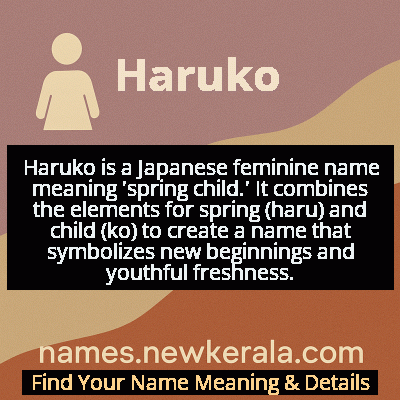Haruko Name Meaning & Details
Origin, Popularity, Numerology Analysis & Name Meaning of Haruko
Discover the origin, meaning, and cultural significance of the name HARUKO. Delve into its historical roots and explore the lasting impact it has had on communities and traditions.
Name
Haruko
Gender
Female
Origin
Japanese
Lucky Number
2
Meaning of the Name - Haruko
Haruko is a Japanese feminine name meaning 'spring child.' It combines the elements for spring (haru) and child (ko) to create a name that symbolizes new beginnings and youthful freshness.
Haruko - Complete Numerology Analysis
Your Numerology Number
Based on Pythagorean Numerology System
Ruling Planet
Moon
Positive Nature
Diplomatic, friendly, artistic, empathetic.
Negative Traits
Over-sensitive, moody, indecisive, prone to self-pity.
Lucky Colours
Green, cream, white.
Lucky Days
Monday.
Lucky Stones
Pearl, moonstone.
Harmony Numbers
1, 3, 4.
Best Suited Professions
Diplomats, mediators, caregivers, artists.
What People Like About You
Cooperative spirit, friendliness, artistic talent.
Famous People Named Haruko
Haruko Watanabe
Actress
Prominent Japanese film and television actress known for traditional roles
Haruko Obokata
Scientist
Stem cell researcher who published controversial STAP cell research
Haruko Sugimura
Actress
Renowned actress in Yasujirō Ozu films, known for portraying traditional Japanese women
Haruko Momoi
Voice Actress/Singer
Popular voice actress and J-pop singer in anime industry
Name Variations & International Equivalents
Click on blue names to explore their detailed meanings. Gray names with will be available soon.
Cultural & Historical Significance
Extended Personality Analysis
Individuals named Haruko are commonly associated with characteristics that mirror the spring season's qualities - they are often perceived as warm, nurturing, and full of life. There's a general expectation that Harukos possess an innate grace and emotional intelligence, allowing them to navigate social situations with ease and bring people together. They tend to be resilient yet gentle, capable of adapting to change while maintaining their core values. Many people imagine Harukos as having artistic sensibilities and an appreciation for beauty, whether in nature, art, or human relationships. Their spring-inspired name suggests someone who approaches life with optimism and the ability to renew themselves and others after difficult periods, making them natural caregivers and peacemakers in their communities.
Modern Usage & Popularity
In contemporary Japan, Haruko has transitioned from being a common given name to more of a classic or vintage choice. While it's no longer among the top names for newborn girls, it maintains a presence particularly among older generations and in families valuing traditional names. The name has experienced a slight resurgence in recent years as part of the retro naming trend, where parents choose names from their grandparents' generation. Internationally, Haruko has gained some visibility through Japanese cultural exports, particularly anime and manga, where characters with this name often embody traditional Japanese femininity or interesting contrasts to it. The name's usage outside Japan remains rare but is occasionally chosen by parents attracted to Japanese culture or seeking a name with natural, seasonal symbolism.
Symbolic & Spiritual Meanings
Beyond its literal meaning of 'spring child,' Haruko carries rich symbolic weight representing the eternal cycle of renewal and the beauty of transient moments. The name evokes the Japanese philosophical concept of wabi-sabi - finding beauty in imperfection and impermanence, much like the brief but glorious cherry blossom season. Symbolically, Haruko represents hope emerging from difficulty, new opportunities after endings, and the quiet strength required for growth. The name also connects to Shinto beliefs about nature's sacredness and the kami (spirits) that inhabit seasonal changes. Metaphorically, a Haruko is often seen as someone who brings light and warmth to others' lives, facilitates new beginnings, and embodies the delicate balance between strength and gentleness that characterizes the spring season.

